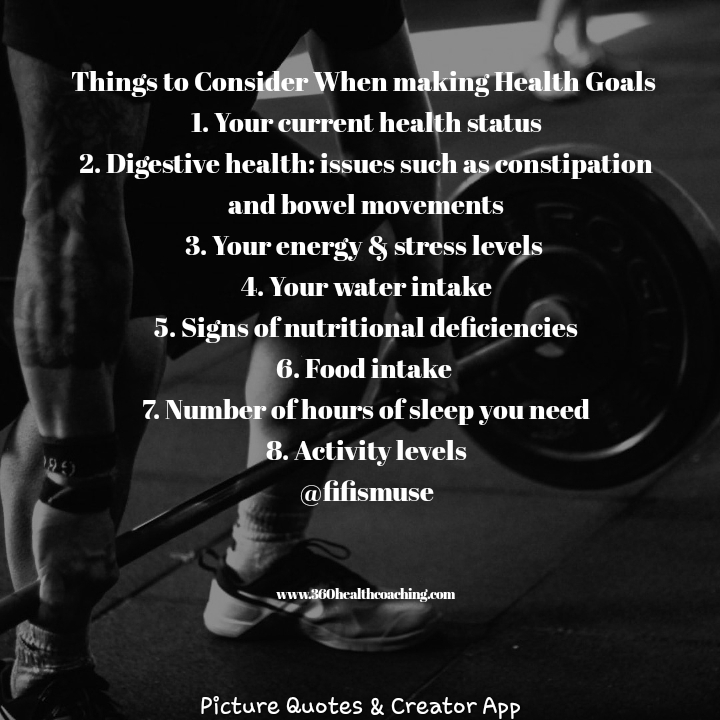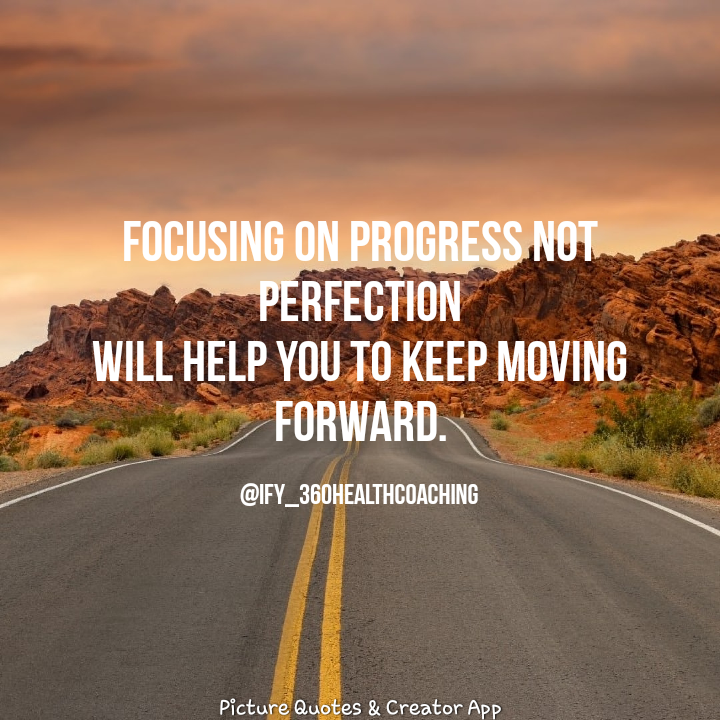Things to Consider when Creating Health Goals
In these times when we have been inundated
with news from a pandemic and social unrest, we need to not forget about our
health. Health goals are not just about exercising, sometimes I hear and see
people talk about fitness goals as though they encompass all health
goals. Your health is connected to different systems in your body. Here are things to consider when making health goals.
Your Current Health Status:
To get to where you want to go, you first have to figure
out where you are. A health assessment could come from your Medical
practitioner giving you a clinical overview of your health status. It could also come from a health coach with a wellness or medical educational background. A rudimentary way to perform your own assessment is to basically take stock of how you feel based on symptoms you are
presenting. For example, if you have been feeling tired, you would need
to go from having low energy to having enough energy to get through your day.
Motivation to make and follow health goals starts with a realization of your current
status and a desire to feel better.
Digestive Health
The food we eat affects how we feel, how
much energy we have, how often we have a bowel movement, among other things.
High fiber foods such as fruits and vegetables decrease the risk of
constipation. Fried foods, alcohol, milk, processed grains such as those found
in white bread, white rice, and white flour products increase the risk of
constipation. Here is
a list of seven foods that could increase or cause constipation. From my
personal experience, combining bread or rice with high fiber foods such as
fruits or vegetables does not lead to constipation. Also, there are certain
foods that I listed above like milk, processed foods, and alcohol that cause
constipation in certain people and do not have that effect on other people.
Overall, our food choices affect our health. It is important to note what you are
eating and how it affects your health. This is something I have incorporated
into my health coaching program.
Stress levels:
Increased stress would increase our
cortisol levels and can lead to certain ailments. A research study
led by an epidemiologist, Dr. Sarah Jackson showed that high levels of stress
over a long period of time can lead to an increased waist circumference and
body mass index. Her group used hair strands to measure long-term cortisol
levels in 2,527 participants older than 54 years. The findings showed that
increased cortisol levels were linked to larger waist circumferences. This is
is important because increased waist circumference increases the risk of
diabetes and cardiovascular diseases.
Energy Levels:
Energy levels could be associated with several factors I
listed above. For example, a vitamin D deficiency can cause low energy levels,
so can dehydration and insufficient food intake. Incorporating exercise into your
lifestyle can increase energy levels.
Water Intake:
Water intake is important for proper cell functioning at
the tissue level. It is also important for detoxification. Our human body is
largely composed of cells in what is called an interstitial space. This interstitial space is filled with fluids. Think of it as the fluid that surrounds our cells. Tissues are a collection of
cells. A collection of tissues makes up an organ, and a collection of organs
makes up systems. According to this article by
Tobias and Mohiudinn (2019), a 70kg man (154 lbs) would have a body composition of 60% water. Water makes up more than half of the human body's composition. Dehydration can lead to symptoms such as dizziness and a general lack of energy. When we consider the fact that water is a large part of the body's composition, then it would be easier to understand why water intake is so important.
Signs of nutritional deficiencies and food intake:
To create good nutritional goals, you need to understand the nutritional value of the food you eat. I noted above how a vitamin D deficiency can affect energy levels. There are several other nutritional deficiencies that I will go into in more detail on another post. I have always been a fan of getting a majority of my nutrition from food. A nutritional analysis would help you understand what nutrients you are consuming in the food you eat and which nutrients are lacking. Eating nutrient-rich foods is advisable because you have a source of a wide range of nutrients from one food item. This is one of the reasons I love avocados.
Signs of nutritional deficiencies and food intake:
To create good nutritional goals, you need to understand the nutritional value of the food you eat. I noted above how a vitamin D deficiency can affect energy levels. There are several other nutritional deficiencies that I will go into in more detail on another post. I have always been a fan of getting a majority of my nutrition from food. A nutritional analysis would help you understand what nutrients you are consuming in the food you eat and which nutrients are lacking. Eating nutrient-rich foods is advisable because you have a source of a wide range of nutrients from one food item. This is one of the reasons I love avocados.
Number of Hours of Sleep Needed:
Sleep is an important health goal because it helps you build up your immune system. Have you ever tried going close to 24 hours without sleep? Or have you worked at night when you usually work during the day? If you have tried staying up for 24 hours or more, you will feel out of sorts, to say the least. I had more than 24 hours without sleep when my newborn and I came home from the hospital. It was hard. Rest is necessary to achieve mental clarity and function at your highest mental acuity. When you have a crowded schedule and so many cares, anxieties, and worries, sometimes sleep becomes a luxury and you have to prioritize sleep to get enough of it. Most people feel rested after 7 to 8 hours of sleep. Prioritizing sleep would come with creating a nighttime routine, disciplining yourself to turn off the television or stop doing activities that keep your mind stimulated when you feel your body is ready to shut down. Sometimes it could be emptying your mind by writing a journal so that you are calm enough to sleep.
Activity levels:
Activity levels:
When creating health goals, you need to consider your level of activity because it affects your health. Health goals created around your activity level are easily measurable. Be as specific as you can about time, place, location, and activities that you would like to engage in. If you have been sedentary for a long time, it is not advisable to spring into an hour of full-on intense exercise, you need to ease into it. You can start with a 15-minute walk and gradually increase the duration and intensity of your exercise. Easing into exercise will help prevent injury and burn-out.
References
Mohiuddin.S.S.Tobias A.(May,2nd 2019). Physiology, Water Balance. Retrieved from
Petre, A. 7 foods that cause
constipation.(January 31st, 2020). Retrieved from https://www.healthline.com/nutrition/8-foods-that-cause-constipation#The-bottom-line.
Whiteman, Honor. (February 27th, 2017). Chronic Stress may Raise Obesity Risk. Retrieved from https://www.medicalnewstoday.com/articles/316074#Hair-cortisol-levels-used-to-assess-stress-obesity-link.


